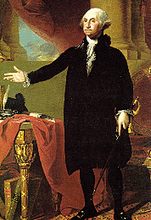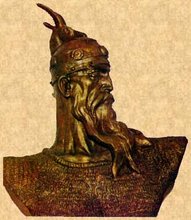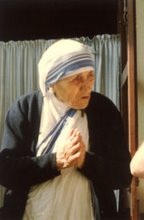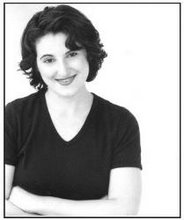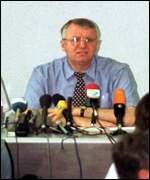A follow up piece six years later in the Chicago tribune about Minic receiving his just desserts.

A dying and AIDS ravaged Minic in 2005.
http://www.chicagotribune.com/news/nationworld/chi-0510230495oct23,1,618
1034.story?page=1&cset=true&ctrack=1
Fleeing past, meeting his death
Wanted for Kosovo war crimes, he ended up in Argentina. But he couldn't
escape AIDS and cancer.
By Colin McMahon
Tribune foreign correspondent
Published October 23, 2005
MENDOZA, Argentina -- Nebojsa Minic looked pitiable on his deathbed,
shriveled beyond recognition, eyes rolling in his head, a misshapen
mouth struggling to utter the simplest of words.
But pity often eludes those who fail to show it themselves. And
according to the survivors of ethnic Albanian families massacred by Serb
militias in Kosovo, Minic never showed humanity, much less pity. If
Nebojsa Minic, commander of the notorious Lightning paramilitary group,
was rotting on the other side of the world, he would get no sympathy
from the Albanian town of Pec.
"Home," Minic said repeatedly in a tense interview Tuesday night, 36
hours before he died. It was one of the few words besides "yes" or "no"
that Minic could say clearly, and he kept coming back to it like a
prayer.
But it was not Pec he meant by home; it was his apartment in the
western Argentine city of Mendoza.
Kosovo? "No," Minic said. He did not want to go there.
Minic's run from his blood-soaked past began in 1999 after the men
of Lightning were accused of dozens of rapes, robberies and murders of
Albanian Muslims in Kosovo. It ended Thursday in a cramped public
hospital in Mendoza, on a plastic mattress with soiled linen, when
Minic, 41, stopped breathing and freed the hand of his devoted Argentine
girlfriend.
In between those bookends of death, Minic stumbled through a
half-dozen countries, through moneymaking schemes that sometimes worked
and sometimes didn't. The odyssey bought Minic time, but it never
brought him peace.
Minic could not escape a Mendoza state police investigator. He could
not escape a jilted lover who gave Minic a roof, food and money only to
be repaid with intimidation. He could not escape cancer and AIDS.
Nor could he escape the horrors of Kosovo or the nickname he adopted
there: "Mrtvi," the Serbian word for "dead."
"He seems tremendously sad," Minic's attorney, Alejandra Ruiz, said
the day before he died. "He cannot imagine a life without war. . . . The
thing is: He could have led a normal life here, and now he's dying."
Minic's "normal" life in Mendoza was a mess of irregularities. He
told people he was rich but often had no pocket money. He opened a
pizzeria called La Bomba without a proper permit. He came into Argentina
on a false passport, was arrested for using a second false passport and
then freed and allowed to stay in Mendoza using his first false
identity.
Friends, lovers and even Minic's guards at the hospital called him
"Vlada" until the day he died. But the real Vlada Radivojevic, whose
identity Minic had assumed, was somewhere in Europe, according to a
police trace of passport and immigration records.
"I was shocked when I saw the files," said Omar Perez Botti,
Mendoza's top police investigator when authorities were tipped about
Minic's true identity in March 2005.
Ghastly crimes
The crimes Minic was accused of ordering or participating in were
ghastly. Munja, or Lightning, was a loose grouping of police, thugs and
self-proclaimed Serb patriots who engaged in violent "ethnic cleansing"
of Albanians from Pec and other Kosovo communities.
Testimony collected by human-rights activists and Serbian
prosecutors accuses Minic of joining a Serb paramilitary raid on the
village of Cuska in which 41 ethnic Albanians were executed. Minic was
also accused of ordering the rape, torture and murder of members of the
Bala family in Pec.
In the interview Tuesday night, Minic responded to a series of
questions with "yes" or "no." Occasionally he forced out a clear word or
a phrase, fighting the paralysis that had spread through most of his
body. His lack of teeth made it worse--Minic had yanked several out
himself when they rotted in his mouth.
Minic's girlfriend, Anahi Escobedo, manipulated Minic's mouth to
help him articulate. She stroked his head, which lacked the long black
and gray hair that had given him a bohemian look a few months before,
and held cigarettes up to his mouth.
Minic held the gaze of his questioners, and there was plenty of fire
left in the blue eyes that had so unnerved and intimidated Lightning's
victims. He acknowledged knowing other members of Lightning. But he
reacted with disdain when confronted with the accusations and when told
that many people in Kosovo hated him.
"No," Minic said, giving his head a slight shake, he did not kill
innocent civilians.
http://www.chicagotribune.com/news/nationworld/chi-0510230495oct23,1,618
1034.story?page=2&ctrack=1&cset=true
"No," the war was not about religion.
"Yes," God still loved him.
"No," he did not regret anything he had done.
"I am not a criminal," Minic said. "I am a soldier."
Minic's definition of soldier is as loose as his definition of war.
Anything went in war, he told friends, lovers and people he merely ran
into through his travels. There could be no such thing as a war crime,
Minic said. And if you were not there, if you did not see the fallen
comrades and the civilians tortured by the other side, then you cannot
know what war is, nor can you judge.
"He would say he was the kind of person who leads," said Iris
Palomares, a 52-year-old science professor in Mendoza who thought that
she and Minic were in love but now believes he was just using her.
"He said, `Some people could say I was a criminal, but others would
say I was a leader who defended my country.'"
Palomares and others said Minic spent hours talking about his life,
especially about the Kosovo war. At times he would say he was a "very
bad person."
Then one night, during a typical conversation in the kitchen, Minic
told Palomares and her son that he was on the Internet. He spoke his
real name, even wrote it down, and suggested she look for him on the
Web. She and her son tried, she said, with Minic by their side. But
maybe because the connection was poor, nothing came up. Minic appeared
surprised.
"I never have understood why he told me that story. He did not tell
me the details. He just gave me the name and told me it was a nom de
guerre," Palomares said. "Maybe he wanted me to turn him in."
Whatever Minic's motive, writing down his real name led to his
arrest.
After Minic and Palomares had a falling out, things turned ugly.
There were disputes over money, with Palomares estimating she loaned
Minic thousands of dollars to get travel documents and start his
business ventures. Minic accused Palomares of stalking him. He even went
to the police for a restraining order.
Then one day, angry and suspicious, Palomares found the name
scribbled among some papers. She went to an Internet cafe and ran a full
search. The screen filled with hit after hit.
"I wanted to die," she said, futilely trying to hold back tears
during a 90-minute interview. "That I had a person like this with such a
past in my house with my children.
"He was always making you feel sorry for him and making you help
him," Palomares said. "I don't understand how I as a grown woman did not
see this."
Palomares went to the local police, and eventually her information
reached Perez Botti. In mid-May, Minic was arrested while being treated
at the hospital for lung cancer and AIDS.
Within weeks, Serbian war crimes prosecutors would request Minic's
extradition. That process was working its way through Argentine courts
when Minic died.
`Not the same man'
On the morning of Minic's death, Escobedo stood by the corpse and idly
rubbed Minic's ankle and calf. She had dressed him in jeans and a light
blue shirt. She had closed his eyes. And she had wrapped a bandage
around his head to keep his jaw closed. It gave Nebojsa Minic a
cartoonish look, like a corpse with a toothache.
"This man called Nebojsa, this is not the same man I know as Vlada,"
Escobedo said.
And she was right. The man lying there was a picture of impotence
and frailty. Minic had decayed from the inside out, and whatever fear,
rage and hate he had been hauling around were no longer dangerous or
frightening or volatile. It was still there, spent, stuck inside him.
cmcmahon@tribune.com
Copyright C 2005, Chicago Tribune










